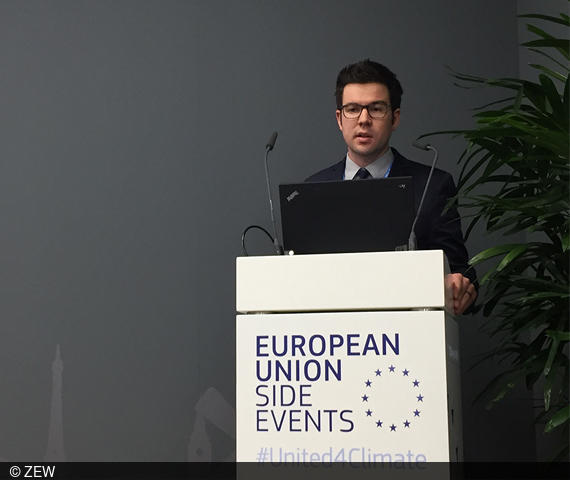ZEW Researchers Discuss Energy Savings in Private Households at UN Climate Change Conference COP23 in Bonn
Dates and NewsHow can we raise awareness among private households about saving energy at home? What is the key to running a successful energy saving campaign? And how can the impact of such a campaign on actual energy usage be scientifically assessed? These are some of the questions addressed by ZEW environmental economists in presenting their latest research findings at the side event “Energy Savings in Housing” held alongside the official negotiations at the UN Climate Change Conference (COP23) in Bonn.
Audience members at the event, organised jointly by ZEW and the University of Münster and held in the EU pavilion, were able to enjoy a spirited discussion with a wide variety of contributions from the field of behavioural research, to the private sector and consumer advice centres. Environmental economists from ZEW and the University of Münster were joined on stage by an environmental psychologist from the University of Groningen as well as representatives from the sustainability solutions provider South Pole Group, the software company Microsoft and the North Rhine-Westphalia Consumer Advice Centre.
Testing household energy saving campaigns in the field
Dr. Martin Kesternich, deputy head of the ZEW Research Department “Environmental and Resource Economics, Environmental Management”, and ZEW Research Associate Professor Andreas Löschel from the University of Münster highlighted the challenges of impact evaluation studies that aim to assess the causal effects of energy saving campaigns on energy savings. As part of their presentation, Martin Kesternich offered some insights into a current field study being conducted under the umbrella of the Horizon 2020 project “Step by Step” financed by the EU. In the study, after initially contacting households in person, researchers used a web-based platform to track them individually by giving them various energy saving tips to implement and asking the households to provide feedback. Kesternich noted that, in energy saving campaigns like this, one considerable challenge is often the question of how to target individual households as effectively as possible through the campaign and how to raise awareness about conserving energy without knowing anything about each household’s specific needs and experiences in advance. For this reason, the researchers decided on a “foot-in-the-door” approach for the project, with households receiving energy saving tips that were relatively easy to implement to begin with, but then became successively more complex over time. Professor Löschel faces similar challenges in his work on the Virtual Institute’s Smart Energy (VISE) project, which is funded by the European Fund for regional development in North Rhine-Westphalia (EFRE NRW) as well as the Horizon 2020 projects PENNY and ENABLE.EU.
Saving energy through technology: consumers in the driver’s seat
The other contributors to the panel discussion also emphasised the importance of identifying the different individual motives households might have to conserve energy. While, as might be expected, financial matters have a significant role to play for many households when it comes to taking active measures to conserve energy, other households are guided by specific social norms and prefer to see their own sense of personal responsibility towards the environment as their main motivation for saving energy. This was also reflected in the contributors’ assessment of potential areas of tension between the use of modern, data-driven technologies to regulate energy consumption and the self-determination of consumers. Though appropriate technological solutions could help households to meet their energy saving targets, at the same time researchers have frequently found there to be a lack of trust among consumers towards complex technology systems, in particular those that work with highly detailed and in some cases even sensitive household data. All the participants in the discussion therefore agreed that, in order to be successful, any technological solution must be tailored to the individual needs of the household in question. In short, the consumer must always be in the driver’s seat.
A productive side event in Bonn
In his closing statement at the end of the event, ZEW Research Associate Professor Andreas Löschel said that the side event had successfully raised a number of exciting thoughts and ideas for decision-makers and consumers with regard to the rapid advances being made in the digitalisation of the energy sector. It was the varied and exciting new ways suggested to lower energy consumption in housing in particular that provoked the most interesting discussions on the podium. The contributors came to the joint conclusion that consumers have as significant a role as regulatory conditions in determining whether the technical potential in the energy sector can be realised to a greater extent.
